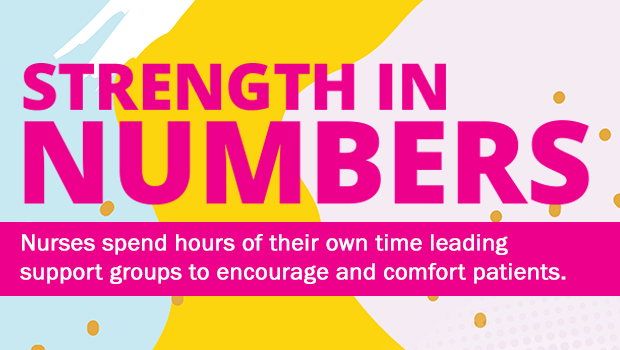
Nurses spend hours of their own time leading support groups to encourage and comfort patients.
Support to Venture OutLoneliness, denial, depression, and lack of confidence – these are some issues amputees may face after the devastating loss of their limbs. Many feel isolated and resign themselves to not being able to venture out into the community again. Since 1999, the nurse-led Amputee Support Group at Singapore General Hospital (SGH) has been working tirelessly to help patients who have lost their limbs. The group currently led by Assistant Nurse Clinician Nur Raudhah, comprises nurses from different specialties, occupational therapists, physiotherapists and medical social workers. The support group organises two outings a year to attractions such as Gardens by The Bay, Madame Tussauds and the River Safari.
Assistant Nurse Clinician Lim Tow Choo, who has been volunteering with the group for 10 years, shares that a memorable outing was to Punggol Park, where the support group members flexed their creative muscles to paint vivid artworks of the scenery. “Some amputees don’t leave the house for months because it is not easy to get around. When they do venture out, they sometimes face insensitive comments from the public. That is why support group outings are so important,” shared Tow Choo. Interacting with fellow amputees helps members develop a positive outlook about their condition. “We had a patient who recently had a prosthesis fitted and she wasn’t feeling confident. But when she saw other patients walking normally with their prosthetic limbs, she started walking more confidently. She went back to work shortly after that,” Raudhah recounted. Lim Teck Meng first joined the group in 2014. The 47-year-old, who lost his lower limb in 2014, is a regular at the group’s outings. “I get to meet others like me; we support and encourage each other. The nurses put in a lot of effort to organise the outings and are always willing to answer any questions we have. I really can’t thank them enough for all that they do. They are truly angels on Earth,” he shared. |
Lean on MeThree-year-old Miranda is an active and playful child. An observer would not be able to tell that this bubbly toddler suffers from epilepsy. “She used to have fits six to seven times a day,” her mother Bei Bei recalled. “The episodes would come without warning – when she was having a meal, or even when she was sleeping. We felt very helpless and devastated.”
The Paediatric Epilepsy Support Group in KK Women’s and Children’s Hospital (KKH) helps to support parents of children with epilepsy. The group was initiated in 2014 by Nurse Clinician Martha Kao and Senior Staff Nurse Hoh Sing Yee. They also enlisted the help of neurologists, pharmacists, medical social workers, psychologists, sports medicine specialists, volunteers and medical students. Martha shared, “The critical period for parents is when the disease is first diagnosed. Doubts and uncertainties about the child’s future worry them. We have seen cases where parents or grandparents decided to take things into their own hands and adjust or stop the medication without consulting the doctor. This can be disastrous for the child.” There are currently more than 100 parents, caregivers and patients in the support group. With the patients’ ages ranging from a few months to over 20 years old, the group organises a wide range of events, from a Sports Day for children, to educational talks on topics such as myths about epilepsy and the different stages of childhood epilepsy. These sessions also give parents and caregivers the opportunity to interact. “The talks help the parents make informed choices for their children. It’s also a time for them to share their problems and concerns,” added Sing Yee. For Bei Bei, the support group is a source of reassurance. “When parents see how others cope with the situation or have overcome the same challenges, it makes them feel less alone and more confident that their children will grow up to lead normal lives.” |
















 Get it on Google Play
Get it on Google Play